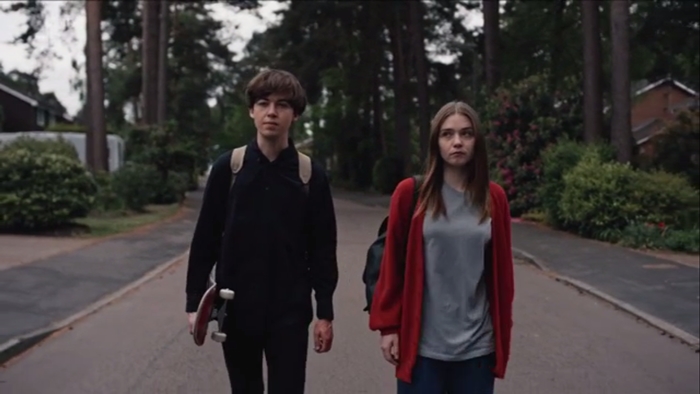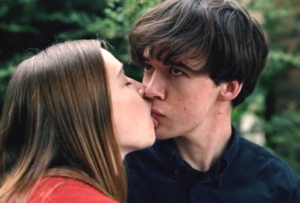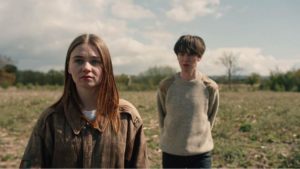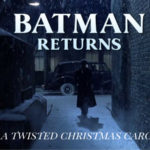
The End Of The F***ing World: Episode 1 (Netflix/BBC)
Starring: Alex Lawther & Jessica Barden
Directed by Jonathan Entwistle
Written by Charlie Covell
Based on the comic: TEOTFW by Charles Forsman
Review by: Joshua Leto

We didn’t have a television in my house from when I was aged two to twelve. As a kid trying to escape, I spent a lot of time reading. I read and reread any comics I could get my hands on, as well as books and magazines. Like some Luddite geezer, I have long wanted to read the book before I see the movie. I loved Hulk, Wonder Woman, and Superman, but I could see right away that they could never replicate the things I loved about comics on-screen. Comics and movies and TV are all different mediums and trying to compare them is a fool’s errand.
I started reading TEOTFW as a mini-comic, then a graphic novel from Fantagraphics. I enjoyed it a great deal, both story and art, and followed Forsman since. This television show is an entirely different beast, as it should be.
Episode one, according to the internet, was filmed as a short film and used as a pilot that was eventually re-shot to what we see here. It does a good job of setting a tone for the show. It avoids something that many shows undersell, which is the power of an image, even a static one. This episode presents shots with nice framing and interesting locations. The interior sets are distinctive but don’t look very lived in.
There are several nice short sequences of montage, which are both attractive and use the quick cuts to move the scene forward. I particularly liked the fantasy shots where we see into James’s (Alex Lawther) fantasies of how he might execute Alyssa (Jessica Barden), especially when juxtaposed against her voiceover intimating how great she thinks everything is going: “I feel comfortable with him, sort of safe.”
Introduced first, I thought James would be the focus. He describes himself as a psychopath, so the typical viewer should feel some distance. We see cracks in his psychopathy right away, such as when he blames himself for not having a sense of humor because he doesn’t enjoy his father’s cheesy jokes. Later, we see plenty of emotion: bemusement at Alyssa’s introduction; embarrassment at her speaking up in front of his dad; curiosity with her prompt to get out of town.
Through both performance and character, Alyssa provides access to the world of these characters, and I connected with her immediately. Not only is she charming, in a roguish way, but she is given a few of the best jokes in the episode. She portrays a worldview which is easy for outsiders to relate to and is billed first in the credits. Her billing is presumably for her notable work outside of this series, but I couldn’t help but see her as the focus, above James.
 This episode spent some time firmly in the genre of teenage-centric dark comedy, with sequences where the main characters interact with their others to show how different their lives are. “I thought probably he was gay, which was, that’s fine, like,” James’s father says. There is a scene where Alyssa sends a clear message to her cohort that she is different from the rest of the sheep and smashes her phone. And a few scenes where they live their lives free from all real responsibility. I think the reason these work so well, even though they are all tropes of every teenaged movie going back decades, is that each generation is perennially misunderstood by the generations before.
This episode spent some time firmly in the genre of teenage-centric dark comedy, with sequences where the main characters interact with their others to show how different their lives are. “I thought probably he was gay, which was, that’s fine, like,” James’s father says. There is a scene where Alyssa sends a clear message to her cohort that she is different from the rest of the sheep and smashes her phone. And a few scenes where they live their lives free from all real responsibility. I think the reason these work so well, even though they are all tropes of every teenaged movie going back decades, is that each generation is perennially misunderstood by the generations before. As we get older, we sometimes forget that no one is fully formed at seventeen, if ever. Therefore the teenagers we judge based on their behavior will be happy to disown their own actions just a year down the line as they shoot through the learning curve of life. Add to this that nearly everyone feels like the odd one out of whatever group they are in.1
Thinking of the source material and its episodic nature, I liked the idea of this as a series, and I think the format works well. The first episode ends by kicking off the plot proper with our protagonists running away and off down the road. It’s minor plot propulsion, which is expected from the tone of the comic. I hope that future episodes continue the character-driven motivations, rather than see them pulled along by plot. This being the case with a certain other Netflix mega-hit.
The adult characters so far seem undercooked. The dopey father, the narcissistic mother, and the lecherous stepdad are all pretty broadly painted. If our main pair truly does run off for the rest of the series, this won’t matter much.
I enjoyed all the music cues, including the two songs I recognized. There is a credit for Graham Coxon, the founding member of Blur, for “Original Score and Songs.” I can’t imagine doing much better than him to pick the music for a show about angsty teenagers.
1. My ex-mother-in-law, a lovely woman, had nine siblings. I heard her, and at least five of them claim they were the black sheep. I’m convinced that all ten genuinely felt that way.



